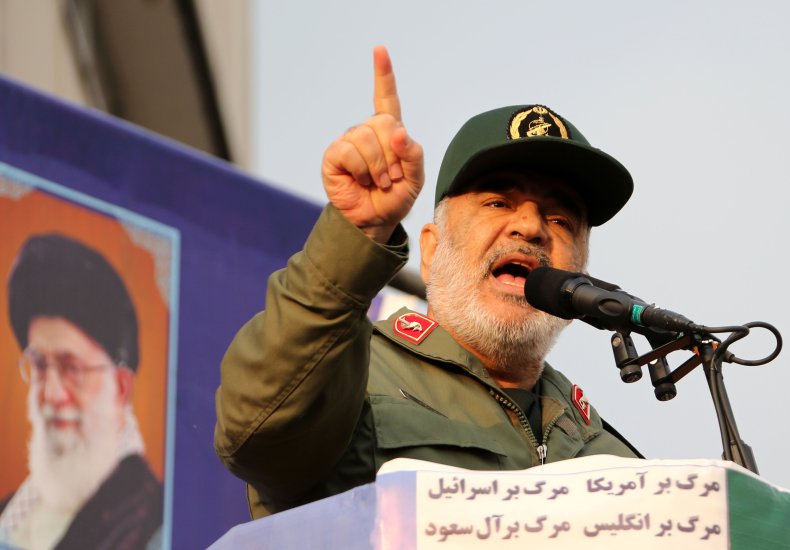BY TOM O'CONNOR
The head of Iran's elite Revolutionary Guard said recent events across the Middle East have exposed vulnerabilities in Israel, which he argued could be defeated with just one, decisive blow should a conflict break out between the two top foes.
In an interview aired Wednesday by the semi-official Islamic Republic of Iran Broadcasting, Major General Hossein Salami discussed recent developments he argued belied Israel's weakness.
These included an apparently ongoing series of cyberattacks affecting dozens of Israeli companies that began late last year; the alleged execution of suspected Israeli spies in the northern Iraqi city of Erbil in January; explosions that rattled a petro Israeli port city of Haifa in February; last month's missile factory blast at a missile site; and landing of a Syrian anti-air missile near the Dimona nuclear reactor—as well as a recent fire that broke out by Ben Gurion International Airport.
The senior military official said Israel was especially at risk due to its reliance on maritime trade, something he claimed accounted for 90 percent of Israel's trade. These routes, he said, "could be easily disrupted," and he argued the country's relatively small size made it susceptible to a devastating strike.
"Their biggest weakness is that any tactical action could bring about a strategic defeat to them," Salami said, "meaning that just a single operation can ruin this regime."
 Iran's Revolutionary Guards commander Major General Hossein Salami speaks during a pro-government rally in the capital Tehran's central Enghelab Square on November 25, 2019.ATTA KENARE/AFP/GETTY IMAGES
Iran's Revolutionary Guards commander Major General Hossein Salami speaks during a pro-government rally in the capital Tehran's central Enghelab Square on November 25, 2019.ATTA KENARE/AFP/GETTY IMAGESThe remarks came as indirect talks between the U.S. and Iran continued to play out in Vienna with the aim of coordinating Washington's return to a multilateral nuclear deal abandoned in 2018 by former President Donald Trump. The two sides are attempting to overcome an impasse over the terms of a potential reentry by President Joe Biden's administration and Tehran's reimplementation of uranium enrichment limits it suspended as a result of non-compliance by Western parties to the accord.
As negotiations play out involving China, the European Union, France, Germany, Russia and the United Kingdom, political tensions have arisen within Iran ahead of a presidential election set for June. The vote will bring about the end of Iranian President Hassan Rouhani's second and final term, and the Guardian Council is expected to soon announce a list of candidates that will vie to succeed him.
Many are expected to represent more conservative elements, and even former military officials skeptical of Iran's strained diplomacy with the United States and Europe.
Meanwhile, a shadowy conflict between Iran and Israel has continued to play out across the Middle East. Both sides have often blamed one another for unclaimed incidents such as attacks that appear to have struck ships owned by both countries in the Red Sea in recent months.
Israel Prepares to Live with U.S.-Iran Nuclear Deal And Middle East Impact
Iran has also accused Israel of clandestine efforts to disrupt the Islamic Republic's nuclear program, such as the assassination of a leading nuclear scientist in November and a blackout that struck a key facility in Natanz last month. Iranian officials have argued their nuclear program was never intended to produce a weapon of mass destruction, but Israeli officials doubt this and oppose a U.S. return to the nuclear agreement.
At home, Israel was also undergoing political tensions and the country struggled to form a government after the fourth election in just two years was held in March. Following Israeli Prime Minister Benjamin Netanyahu's failure to form a governing coalition on Wednesday, President Reuven Rivlin tapped the Israeli leader's rival, Yair Lapid, to attempt to pull together a new government, a development that would end the tenure of the longest-serving prime minister in Israeli history.
The contest unfolds as clashes continue between Israeli security forces and Palestinians in Jerusalem. The strife erupted in recent days amid Israeli efforts to oust Palestinian residents in the Sheikh Jarrah neighborhood of the disputed city's occupied east and replace them with Israelis claiming to have lived there prior to the establishment of Israel and the subsequent war with Arab states that broke out in 1948.
The case has received international attention, including from Iran, which backs Palestinian claims to territory settled prior to Israel's establishment. Tehran also has ties to militias operating in the Palestinian-controlled Gaza Strip, from which a wave of rocket attacks was launched last month.
No comments:
Post a Comment